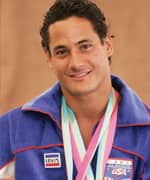Life Extension Magazine®
The only competitive diver to win two gold medals in back-to-back Olympic Games, Greg Louganis, is again making history, only this time by conquering a life-threatening disease. In 1988, Louganis received an HIV-positive diagnosis, which was then widely viewed by the medical profession as a death sentence. For the past 23 years, however, Louganis has been enhancing his health through an ever-evolving combination of Western medicine, with a strict pharmaceutical regimen, acupuncture and Chinese herbs, nutritional supplements, a low-fat nutrient dense diet, and daily exercise. Today, he reports, "The HIV virus may remain in my body, but it's now undetectable. My T cells have never been higher." (T cells are one type of "fighter" white blood cells that help the immune system battle infectious diseases such as AIDS.)1 Before the advent of the carefully calibrated "cocktail" of anti- viral drugs, such success in fending off the disease and achieving a healthy life were almost unheard of. These pharmaceutical regimens are known as highly active antiretroviral therapy or HAART and usually include drugs classes that target retroviral replication. These "cocktails" generally include:
Naturally, it follows that many of Louganis's healthy lifestyle choices and habits center on immune enhancement. He receives weekly acupuncture treatments for this and for musculoskeletal pain relief. "I love the way it makes me feel," he says. "It's very relaxing, kind of like a mind/body tune-up." As it happens, prescribing acupuncture treatments for immune enhancement is standard among integrative medical practitioners' offices. A study published in AIDS Care found that HIV-affected individuals showed improvement in their T cell counts after acupuncture treatment when compared with the non-treatment group.2 Like Louganis, study subjects rated their experiences of the acupuncture as very positive. It's also worth noting that since 1979, the World Health Organization (WHO) has endorsed acupuncture treatment for more than 40 health conditions ranging from gingivitis to knee pain.3
When Louganis receives acupuncture from Santa Monica, CA, acupuncturist Michael Vercos, he also takes a Chinese herbal formula. This uniquely crafted, customized blend contains a varied and changing combination of herbs that are documented antioxidants, immune enhancers, and tumor growth fighters. "The formula changes according to what my body needs at a given time and season," he says. Research on popular Chinese herbal immune-enhancers such as curcumin and other derivatives of the turmeric plant documents powerfully positive effects on those with HIV. While curcumin inhibited enzymes such as purified HIV type 1 integrase, HIV-1 and HIV-2 protease, it additionally restrained gene expression of acutely or chronically infected HIV-1 cells and inhibited release of chemical messengers involved in stimulating HIV-1 replication.4 Numerous other Chinese herbs been found to exert powerful antioxidant effects, anti-inflammatory activity, and inhibit tumor growth.5,6 As befits an Olympic champion, daily exercise is central to Louganis's health regimen."My favorite physical activities are yoga and spinning," he says. While Louganis has a daily yoga practice that he does at home and while traveling, he also takes classes when he can. "I like yoga because it's mindfulness-based meditation that's also stretching, toning, and relaxing exercise," he says. "Your own body weight serves as resistance and the focused breathing helps the body relax and heal." Research bears out Louganis's belief in yoga's health-enhancing effects: In one study, HIV-affected individuals who practiced an eight-week course of mindfulness-based stress reduction were found to significantly increase natural killer cell activity and number as compared to those HIV-positive individuals who did no such practice.7 Along with swimming in his pool overlooking the Pacific Ocean in Malibu, California, Louganis also works out at the gym by lifting weights and taking spinning classes. Spinning is a form of indoor exercise which involves riding a special stationary exercise bicycle with a weighted flywheel. The low-impact exercise classes focus on endurance, strength, intervals, higher intensity exertions, and then recovery. "Spinning is very good for cardio strengthening and overall conditioning," he says. "It's a satisfying workout and a lot safer than riding a bike on the street." Louganis sees his physician, Tony Mills, MD, of Los Angeles for regular blood tests to check his immune system. A critical component of his impressive and effective wellness program includes 10 prescription pills every day that Dr. Mills prescribes. Louganis says his diet consists of "…very little red meat, lots of lean, nutrient-dense protein such as fish and grilled chicken, organic vegetables and fruits plus dairy products in moderation." While he acknowledges that, "The supplements that I take may not be appropriate for someone else's condition, there is some evidence that supplements can provide immune support." Indeed, a research study presented at the 18th International AIDS conference in Vienna, Austria, tracked HIV-positive individuals in Botswana who were not on anti-retroviral therapy who were given a supplement combination consisting of B complex, vitamin C, vitamin E, and selenium. This study demonstrated that long-term micronutrient supplementation was safe and significantly delayed the onset of AIDS as compared to those who took no supplements.8 As Louganis puts it, "If you're immune-compromised, you need to work with your doctor on what supplements to take so that you can make a positive difference." Given his Olympic diving achievements and the fact that he's rewritten his destiny by living with HIV for over 20 years, Louganis has made a positive difference that can inspire us all. If you have any questions on the scientific content of this article, please call a Life Extension® Health Advisor at 1-866-864-3027.
|
References1. Available at: http://www.nlm.nih.gov/medlineplus/ency/article/003516.htm. Accessed May 17, 2012. 2. Henrickson, M. Clinical outcomes and patient perceptions of acupuncture and/or massage therapies in HIV-infected individuals. AIDS Care. 2001;13(6):743-48. 3. Bannerman RH. Acupuncture: the WHO view. World Health. 1979 Dec:24-29. 4. Cohly HHP, Asad S, Das SK, Angel MF, Rao M. Effect of antioxidant (turmeric, turmerin, and curcumin) on human immunodeficiency virus. Int J Mol Sci. 2003 Jan;4(2):22-33. 5. Zhang L, Ravipati AS, Koyyalamudi SR, et al. Antioxidant and anti-inflammatory activities of selected medicinal plants containing phenolic and flavonoid compounds. J Agric Food Chem. 2011 Dec 14;59(23):12361-7. 6. Weber D, Wheat JM, Curri GM. Inflammation and cancer: tumor initiation, progression and metastasis, and Chinese botanical medicines. J Chin Int Med. 2010 Nov;8(11):1006-13. 7. Robinson P, Mathews HL, Witek-Janusek L. Psycho-endocrine-immune response to mindfulness-based stress reduction in individuals infected with the human immunodeficiency virus: A quasi-experimental study. The Journal of Alternative and Complementary Medicine. 2003 Oct;9(5):683-694. 8. Available at: http://pag.aids2010.org/abstracts.aspx?aid=10052. Accessed May 17, 2012. |




